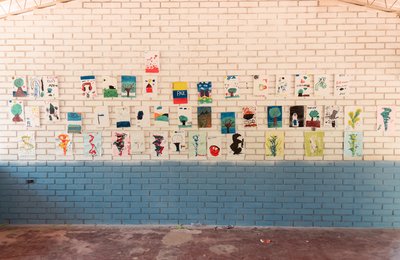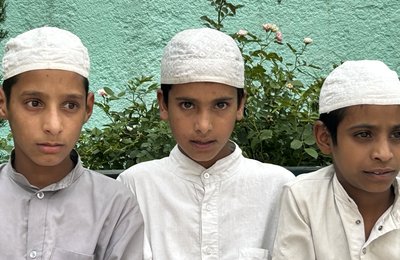Disinformation in wartime: A poison for peace in North Kivu
North Kivu, a territory of the DRC, has been marked by decades of armed conflict, currently between the rebel group M23/AFC and the Armed Forces of the Democratic Republic of Congo (FARDC). But beyond the fighting on the ground, another, more insidious war is raging: that of information. The proliferation of disinformation and media propaganda is not just fuelling confusion; it is actively sabotaging peacebuilding efforts and reinforcing social instability.

In North Kivu, 70% of young people are unemployed and access to quality education remains limited. The manipulation of information is becoming a formidable weapon, exacerbating community tensions and enlisting young people in conflicts that are often beyond their comprehension.
Jean, a 24-year-old former combatant recruited by an armed group, explains:
"When I joined the movement, I was told I was defending my community against invaders. On WhatsApp, I saw videos showing massacres supposedly committed by the enemy. But once I was in the field, I realised that it wasn't all true. We were attacking villages where the people were innocent. I ended up fleeing, but many of my friends stayed."
North Kivu: an unstable border and an information war
The province of North Kivu, bordering Rwanda and Uganda, is an area of strategic interest where economic, geopolitical and identity-related issues are intertwined. In this uncertain environment, disinformation takes many forms:
- Political and military manipulation: Rumours orchestrated by various players, including foreign powers, aimed at legitimising or discrediting certain armed groups.
- Falsification of facts on social networks: Propagation of images and videos out of context to stir up fear and inter-ethnic hatred.
- Censorship and institutional opacity: crucial information, such as the capture of Goma by the M23/AFC at the end of January 2025, was concealed or played down, forcing the public to turn to unreliable alternative sources.
As a result, public confidence in the media and institutions is deteriorating. A study by the Hirondelle Foundation estimates that 43% of people listen to local radio on a daily basis, but only 46% of them say they have a moderate to high level of confidence in the media (2019), encouraging the use of rumours and propaganda.

Young people join the M23 after its meeting in the town of Goma, February 2025.
Young people, victims and instruments of disinformation
Young people are the first victims of this information chaos. Already faced with endemic poverty and limited access to education, they become easy targets for propagandists and armed groups.
The recruitment of young people is exploited through disinformation campaigns broadcast on WhatsApp and Facebook, leading them to believe that they are fighting for a legitimate cause, when in fact they are often serving hidden political or economic interests.
As hate messages circulate, inter-ethnic conflicts are amplified, especially as latent tensions are transformed into open violence, leading to revenge and radicalisation among the young people who use these social networks.
The consequences are dramatic: according to the UN report (April 2022-March 2024), 4 006 children were forced or used as combatants or scouts, in a context where disinformation (rumours of attacks, false accounts) was frequently used.
Fragile efforts for reliable information and lasting peace
Despite this hostile climate, initiatives are emerging to counter misinformation and promote responsible information:
- Fact-checking and independent journalism: Platforms such as Congo Check, U-Report and local radio stations are endeavouring to verify and correct false information circulating online through field investigations and the gathering of eyewitness accounts, images and videos.
- Media education and critical thinking: Local organisations such as CORACON, Pole Institute and UCOFEM are organising training courses in Goma and Beni, including on local radio stations (Pole FM, Radio moto Butembo-Beni), to teach young people to identify fake news and diversify their sources of information.
- Regulation and responsibility of digital platforms: Anti-disinformation platforms and local military authorities continue to exert pressure on Facebook, WhatsApp and Twitter to act against disinformation that fuels the war.
However, these efforts remain limited by a lack of resources and public distrust of the institutions.
David, a community radio presenter, explains:
"We have organised programmes to explain to young people how to check information before sharing it. Some understood and even denounced the false news that was circulating. But others are still influenced by rumours circulating on WhatsApp. It's an uphill struggle, but every young person who becomes aware is a victory."

Training journalists in conflict-sensitive journalism in Beni town by CORACON, May 2025.
Recommendations for a more stable North Kivu
Faced with this persistent threat, it is urgent to adopt a global strategy to combat disinformation:
- Involve the State and the international community in regulating online content and media transparency.
- Strengthen investigative journalism and protect journalists who expose the manipulation of information.
- Invest in digital education so that the population can better discern facts from manipulations.
North Kivu needs more than military and political solutions to restore peace. As long as the information war continues to sow mistrust and division, stability will remain out of reach. It is time to arm the population not with guns, but with the truth.





